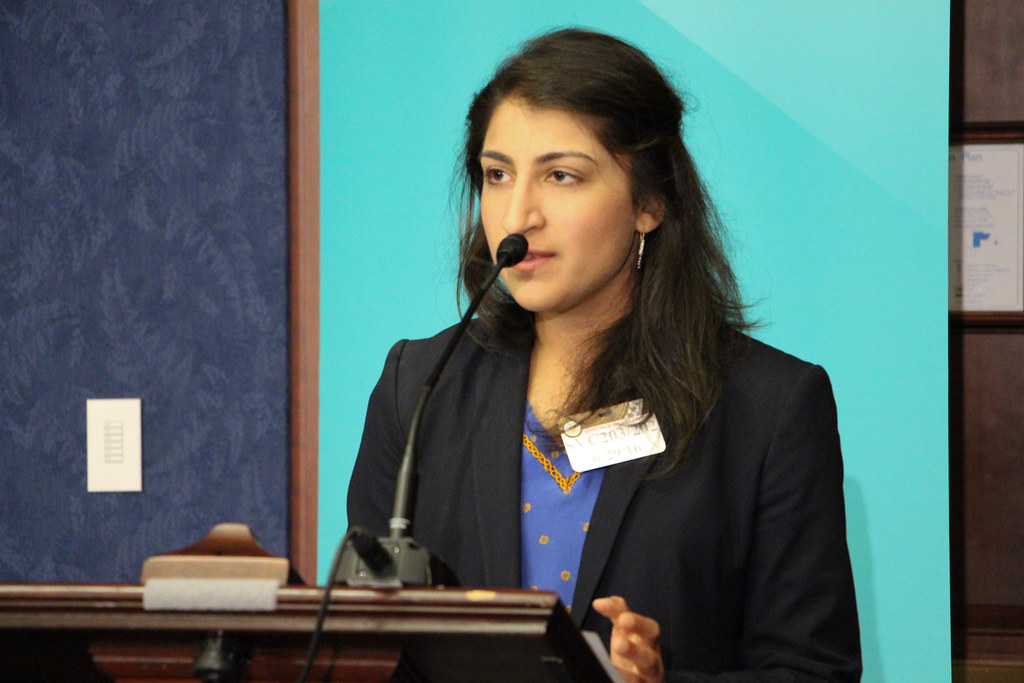
Lina Khan, chair of the Federal Trade Commission, has long been a thorn in Amazon’s side.
In May, she led the FTC in a case against Amazon, alleging the company’s Ring doorbell camera and its virtual assistant Alexa had violated customers’ privacy rights. Amazon ended up paying over $30 million in settlements. Now, the FTC is suing the e-commerce giant for using unfair practices to keep competitors from pricing goods at rates that would rival its own.
In an interview with CNBC, Khan said, “In short, Amazon has a policy that punishes sellers or retailers that lower their price anywhere other than Amazon. At the same time, Amazon is also steadily hiking the fees the seller pays. Sellers have to inflate their price not just on Amazon, but also across the rest of the internet.”
Khan was born in London to a British family of Pakistani descent, and moved to the U.S. when she was 11. She started her career as a reporter and policy analyst, and turned down a job with The Wall Street Journal in 2014 to attend Yale Law School. After graduating, she became an associate professor at Columbia Law School. Khan made history in 2021 when she was sworn in as chair of the FTC at the age of 32 – making her the youngest person in history to hold the position. In her first hearing in July 2021, she made it clear she was ready to challenge not just corporations, but antitrust laws themselves, saying the U.S. needed to operate under “a different set of rules.”
Her criticisms date back even further than that. In 2017, the then-law student at Yale, wrote a now-famous article called “Amazon’s Antitrust Paradox” that pointed out loopholes in competition law. She wrote that such laws have always operated under the “consumer welfare standard,” which only requires the government to intervene when customers are hurt by increased prices. Amazon, she argued, skirts around antitrust law by keeping its prices low – but still structures its business in a way that makes it impossible for competitors to fare in the market.
She argued Amazon’s strategy of pursuing “growth over profits” by expanding into spaces like marketing, delivery, publishing, design, television, manufacturing and more has allowed it to “control the essential infrastructure” on which its rivals depend.
In defense to the lawsuit, Amazon’s lawyers are attempting to redefine “market” to include brick-and-mortar retailers, in which case Amazon would only represent a small share. While legal experts anticipate a long battle in court, it’s worth noting that supercompanies are being held accountable at an increasing rate in recent years. This case comes right on the tail of a federal lawsuit against Google, which the U.S. Justice Department has accused of monopolizing the search engine business. Plus, the FTC sued Facebook for illegal monopolization in 2020.
Khan’s past criticism of large corporations have caused both Amazon and Facebook to request that she be recused from their companies’ antitrust investigations, arguing she would “not be a neutral and impartial evaluator.”
The likelihood of this is slim, as the suit is shaping up to be the most substantial move of Khan’s career. Six years after writing a law school article questioning the ethics of “the titan of twenty-first century commerce,” as if by prophecy, she will now be facing that very titan head-on in court.
“This lawsuit is fundamentally about protecting free and fair competition – and the U.S. antitrust laws prohibit firms from using their monopoly power to punish or preclude or prevent competition,” Khan told CNBC. “That’s what our lawsuit lays out and that is what Amazon has done.”



